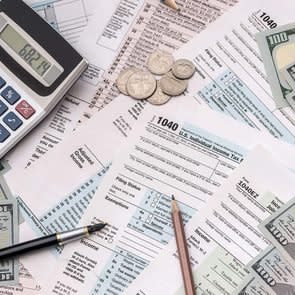The IRS Is Warning About These Upcoming Tax Scams
The Internal Revenue Service’s (IRS) rescheduling of Tax Day from April 15 to May 17—the second year in a row of a coronavirus-inspired delay—is both a blessing and a curse. On the one hand, people will hopefully be better able to find their footing in the second year of a pandemic that’s wreaked havoc on the economy and personal finances. But on the other, unscrupulous people will use the delay to their advantage to commit tax scams, making the already tenuous situation even worse for the victims.
How tax scams work
To understand how COVID-19 is exacerbating tax scams, you have to understand how these scams are carried out in the first place. The scam that most worries the IRS, and other financial experts, in light of the postponement is when scammers file returns as someone else, essentially a form of identity theft, before those people file the returns themselves. “The usual goal with tax-time fraud is to steal someone else’s refund by filing on their behalf before they have a chance to file themselves,” explains Alex Hamerstone, GRC practice lead at TrustedSec. “This is why it’s so important for everyone to file as early as possible. The longer you wait, the greater the chances that a criminal will file for you.” Yes, waiting too long to file your taxes is one of the tax mistakes that could cost you hundreds.
How does this work?
You might feel like you’re safe from this scam because there’s no way a scammer could obtain enough information about you to pose as you on a tax form. But Hamerstone says this is not the case. “In many cases, hackers are able to gather a lot of personal information about you from the various corporate and government data breaches that have already taken place over the years,” he warns. “You may not have done anything wrong yourself, or fallen for any tricks; you’re just a victim of poor corporate cybersecurity.” This is just one of the many tricks hackers use to scam you.
So basically, people who know where to look—like hackers, unfortunately—can find a wealth of information online that they can use to plug into different fields on tax forms, without ever outright “scamming” you with an email or a call. That just goes to show how the Internet is keeping tabs on your every move.
How does COVID-19 make it worse?
Well, if the problem comes from waiting to file your taxes, it’s pretty self-explanatory why delaying Tax Day would make it worse. “Because the tax filing extension has been extended, this gives scammers extra time to try to file a few more fraudulent returns with stolen information,” explains Randy Pargman, senior director of Binary Defense and a former FBI senior computer scientist. “Although we would like to think that the people running scams to take advantage of other people would show some mercy or take a break during a global pandemic, the reality is that many criminals see the current situation as an opportunity to steal more.”
How to protect yourself
It’s certainly not possible for everyone right now, but the most straightforward way to avoid an identity thief filing for you is to file your taxes as soon as possible. You can also protect yourself from scams by shredding—not just tossing—papers containing personal information about yourself.
Also, beware of what information you give over the phone. Never give away details like your social security number, health information, or passwords, even if the caller seems to be from a legitimate source like a health organization or the IRS—and, Hamerstone says, especially then. “Live callers will often claim to be the IRS. The IRS will almost never call you for any reason,” he says. And he warns that even if your caller ID seems to display a legitimate caller, don’t let that fool you: “It is very easy to fake/spoof the number that shows up on your caller ID.”
But not every tax scam is specifically related to identity theft. There are plenty of other “ordinary” scams that are getting a tax-themed spin, like callers impersonating the IRS. “People tend to make bad decisions when they are anxious or scared, and criminals know this,” Hamerstone says. “So by calling someone up and pretending to be an IRS agent, they are immediately able to instill fear and anxiety in the other person.” And, needless to say, COVID-19 has fear and anxiety spiking. It’s easier said than done, but try to stay calm if you get a call that claims to be related to your taxes or coronavirus. Trust your gut; either hang up immediately or “just listen to what they have to say but don’t tell them anything about yourself,” Pargman says.
Pargman likewise says to avoid clicking on files in emails unless you’re sure of the email’s origin. You might already know that links in emails are one of the major ways hackers target you, but “legitimate”-looking files can be a trick too. “We’ve seen a lot of zip files, Word documents, and Excel spreadsheets with file names such as ‘COVID-19.xls’ or ‘Coronavirus alert.zip,'” warns Pargman. “The malicious zip files often contain files with names ending in “.vbs” or “.js” or “.jse”–these are script files that will install malware on your computer if you double-click them.”
Bottom line: You can never be too careful with your money—or with information that might allow people to steal it. Especially right now, when so many people are struggling economically. Here’s how to quickly get money to unemployed or ailing family and friends.
Sources:
Journal of Accountancy: “IRS provides details on April 15 postponement”
Alex Hamerstone, GRC practice lead at TrustedSec
Randy Pargman, senior director of Binary Defense
Secrets Your IRS Agent Won’t Tell You
What Hackers Can Do with Your Email Address
How Scammers Use COVID to Steal Your Info
The post The IRS Is Warning About These Upcoming Tax Scams appeared first on Reader's Digest.



